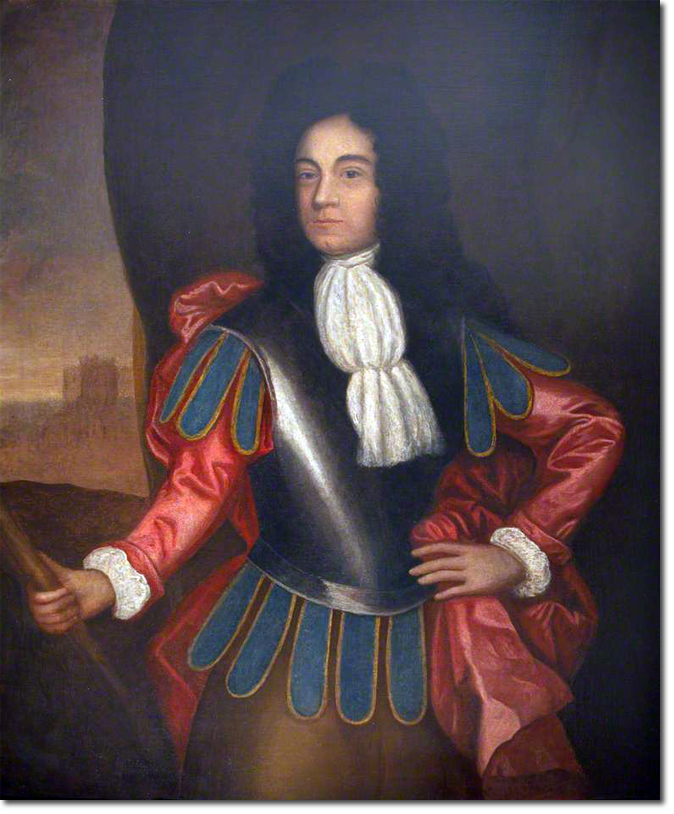|
|


|
|
Christopher Codrington was born in the parish of St John, Barbados, the elder son of Christopher Codrington, member of the council and later deputy governor of Barbados and Nevis and governor-general of the Leeward Islands. The family's wealth derived principally from sugar plantations at Betty's Hope, Antigua, and Consett Bay, Barbados, and from the lease of the island of Barbuda, where both cattle and slaves were bred. From about 1680 Codrington was educated in England, where he attended Dr Wedale's school in Enfield until 1685; on 4 July that year, he matriculated as a gentleman commoner at Christ Church, Oxford. On 13 July 1687 he was admitted a member of the Middle Temple in London while keeping terms at Oxford. In 1690 he was elected a fellow of All Souls, Oxford; he graduated BA in 1691.
Codrington was a friend of many of the most prominent Oxford wits, including Joseph Addison, Charles Boyle, and Thomas Creech. As a pupil of George Smalridge at Christ Church he took the part of the auctioneer, Edward Millington, in a satire on the book trade, Auctio Davisiana. In January 1693, as a volunteer soldier, he sailed for the West Indies and fought in the attack on Martinique. When he returned to Oxford that autumn he was promoted to a captaincy, and he proceeded MA on 29 January 1694. He soon joined William III's army in Flanders, taking part in the capture of Huy in September 1694. In the summer of 1695 Codrington distinguished himself at the siege of Namur, where on 1 August he was promoted lieutenant-colonel and captain of the guards. He was briefly a candidate for the university seat in the election of 1695 and delivered the oration when William III visited Oxford on 5 November, but rejoined his company in April 1696. With the conclusion of hostilities Codrington travelled to Paris in 1698, where he made the acquaintance of Nicolas Malebranche and cemented his friendship with Matthew Prior. Soon after his return to London in July 1698 Codrington learned of the death of his father. The ensuing two years were marked by frantic activity. Codrington secured his own appointment, confirmed in May 1699, as governor-general of the Leeward Islands and deployed his inheritance to purchase the family estate at Dodington, Gloucestershire, from his cousin Samuel in 1700. He composed laudatory verses for his friend Samuel Garth's poem The Dispensary (1699) and organized the publication of Commendatory Verses (1700), which defended Garth and others of his friends from the attacks of Sir Richard Blackmore. In 1700 he also wrote an epilogue for John Dennis's classical tragedy, Iphigenia. His widening circle of acquaintance now included John Locke, who presented him with a copy of the fourth edition of An Essay Concerning Human Understanding (1700). He also engaged the services of Alexander Cunningham to build a library which would eventually number more than 10,000 books, many purchased in continental Europe, but which its owner would never properly see. On 17 August 1700, having made a will, Codrington sailed for the West Indies, leaving Oxford gossips to speculate whether the Bodleian Library might be the intended beneficiary of his bibliomania. Under the shadow of war Codrington worked to strengthen gubernatorial authority, fortify the islands, enforce the Navigation Acts, and discipline corrupt officials. Exploiting his friendship with several members of the council for trade and plantations, he also sought appointment as governor of Barbados. His ambitions were frustrated, however, by the scandal that engulfed him following his personal intervention in the case between William Mead and Thomas Herbert at the Nevis court house in spring 1701. Mead and his associate William Freeman brought a suit against Codrington before the council and later before the House of Commons, alleging that he had abused his power as governor, mismanaged their appeals, and forcibly evicted them from their property. Codrington's friends, notably Charles Boyle, came to his defence and he was exonerated in October 1702, by which time war had broken out again. After initial successes, however, his reputation as a soldier was damaged by his inability to co-ordinate army and naval activities and by the failure of the attack on Guadeloupe in 1703. From April to August of that year Codrington was gravely ill with dysentery and he eventually applied for leave only to be removed from office by the commissioners for trade and plantations. After the death of his immediate successor, in December 1704, Codrington tried (unsuccessfully) to be reinstated as governor. His remaining political actions were devoted to preserving his reputation and his estates. He was never able to implement his plans for reform, in which officials were to be properly salaried and the law rigorously applied by one who knew the ways of the Caribbean colonies. Although he had claimed: 'I have acted with the sincerity of a majestrate in a Platonick Commonwealth', Codrington himself recognized the extent of his failure in public life, remarking that 'the vote has sunk too deep in my heart ever to be removed, and I act now very uncomfortably without pleasure and without ambition'If I live to see England, I will pass my life in my Library and be buryed in my garden' Exhausted by political struggles, Codrington left Antigua in August 1707. In 1708 he mediated in a dispute between the governor, Mitford Crowe, and the Barbados council. He died in the house where he had been born on 7 April 1710 and was buried on the following day in St Michael's Church, Bridgetown. |
Armed Forces | Art and Culture | Articles | Biographies | Colonies | Discussion | Glossary | Home | Library | Links | Map Room | Sources and Media | Science and Technology | Search | Student Zone | Timelines | TV & Film | Wargames